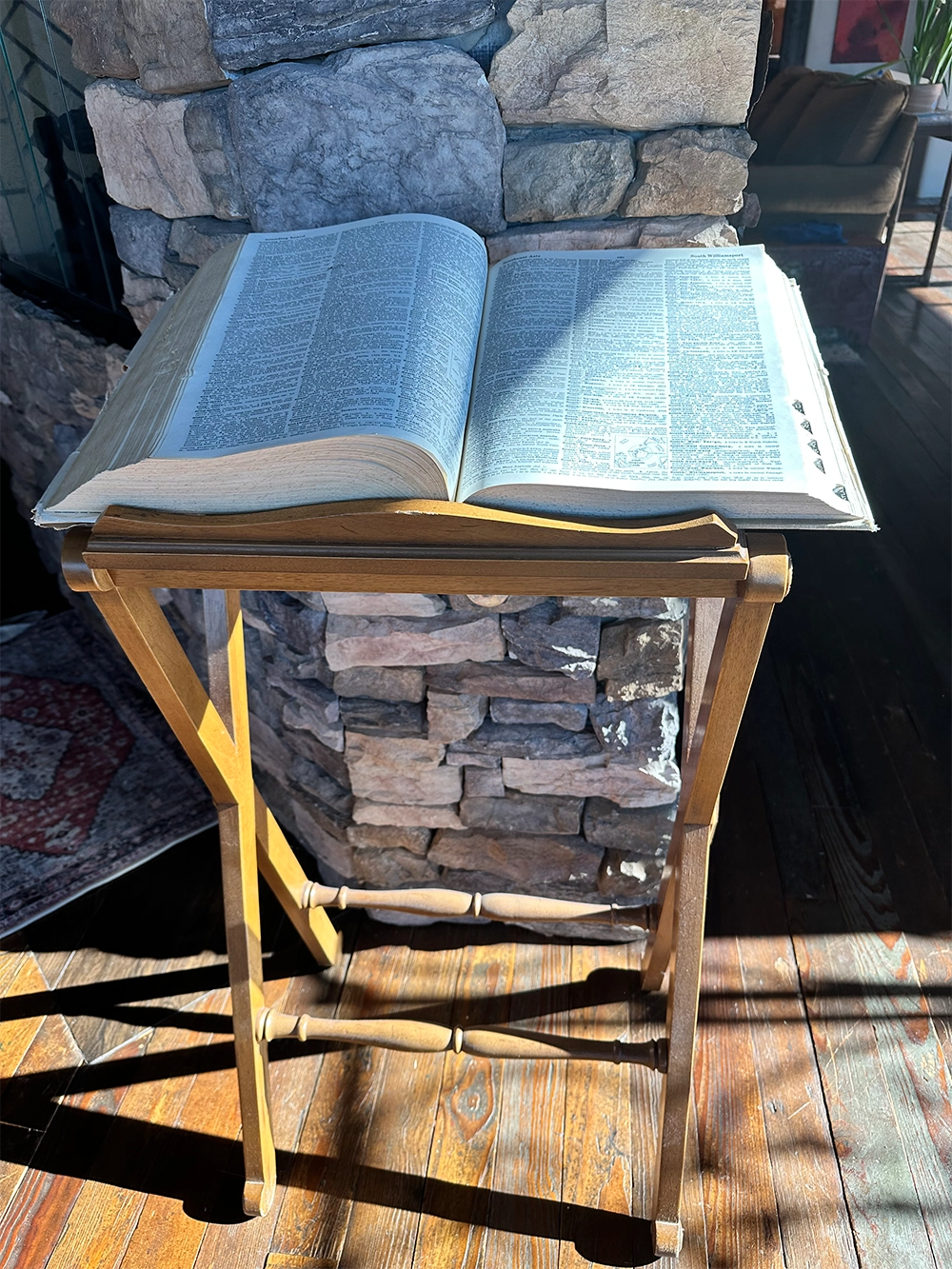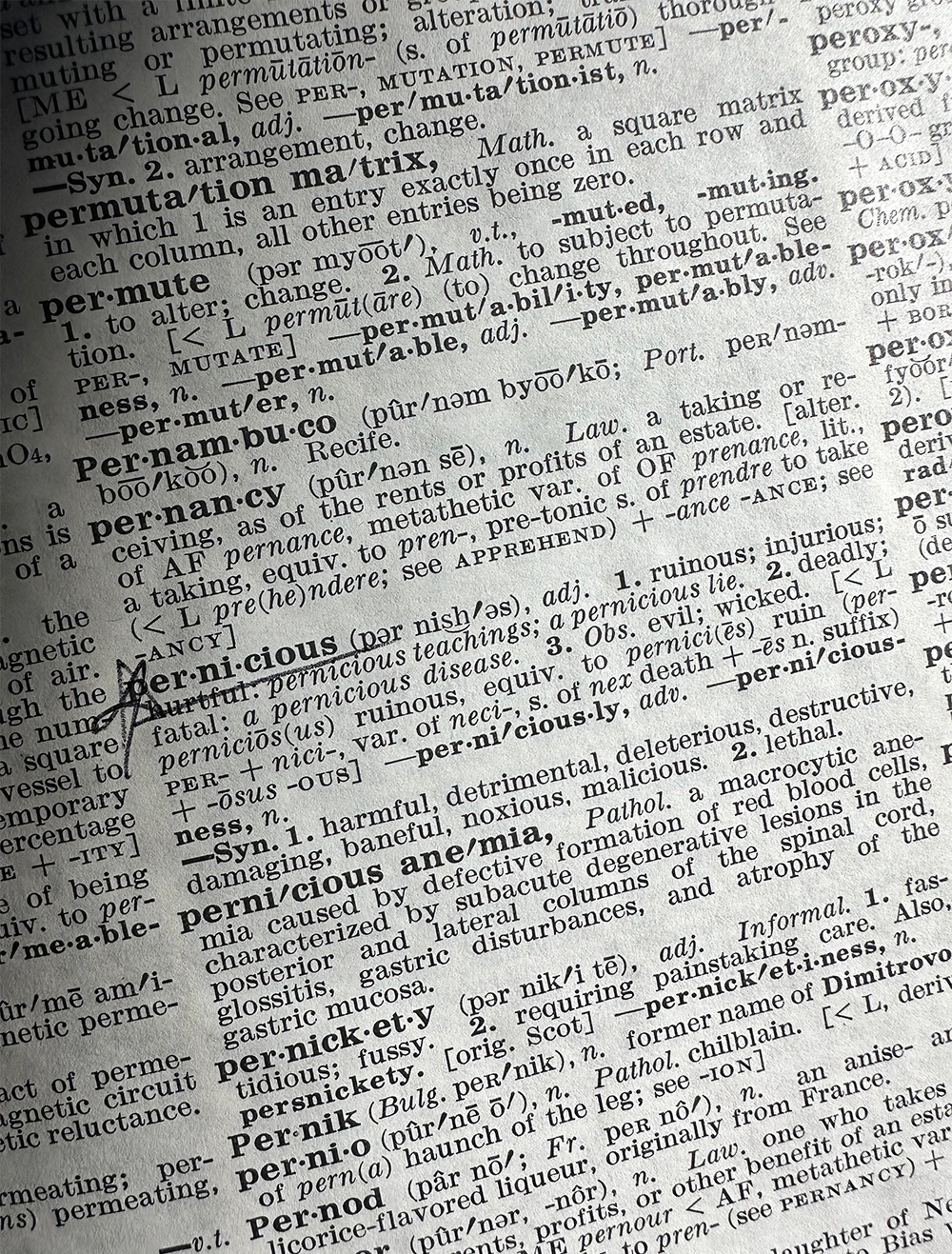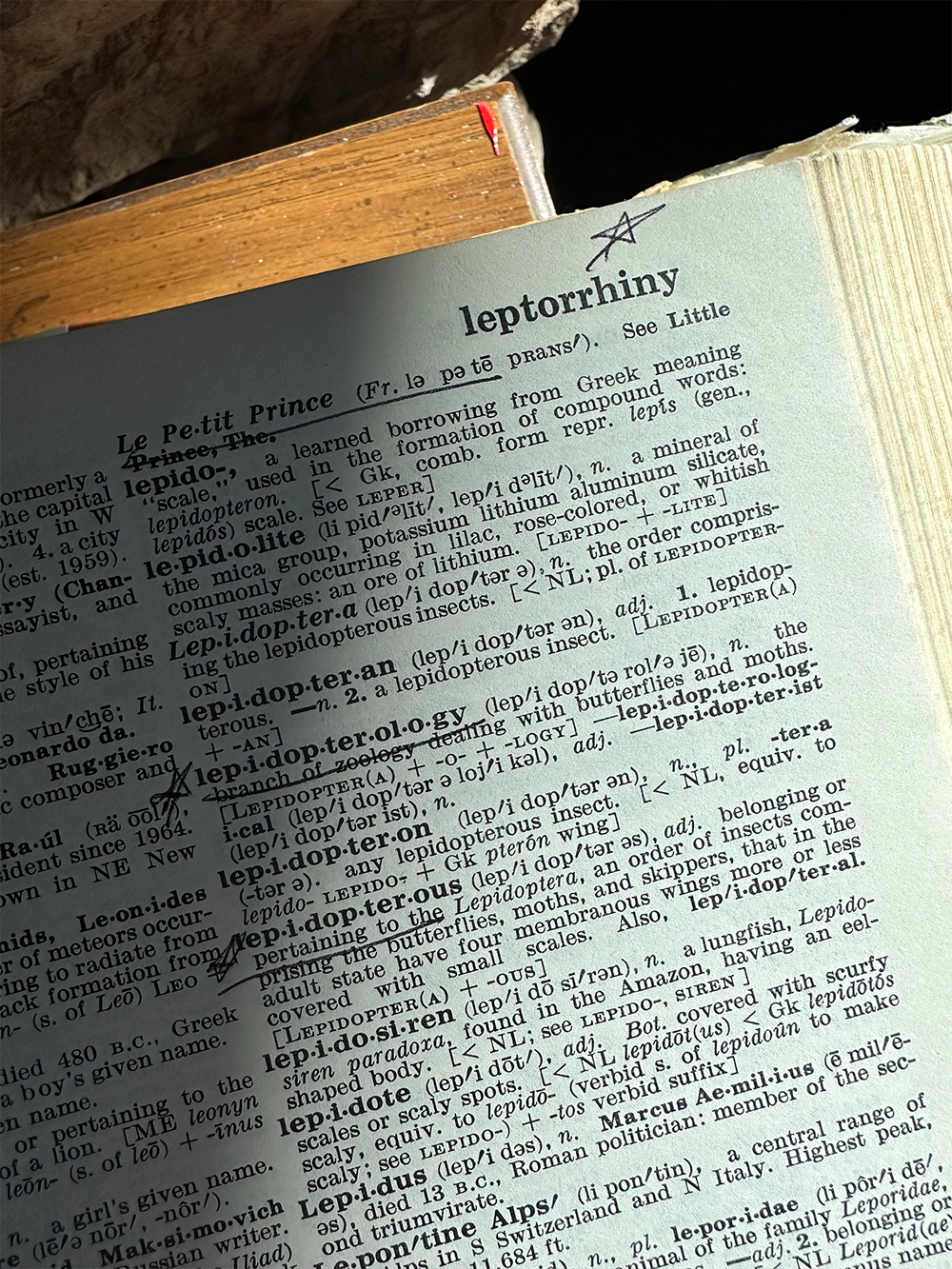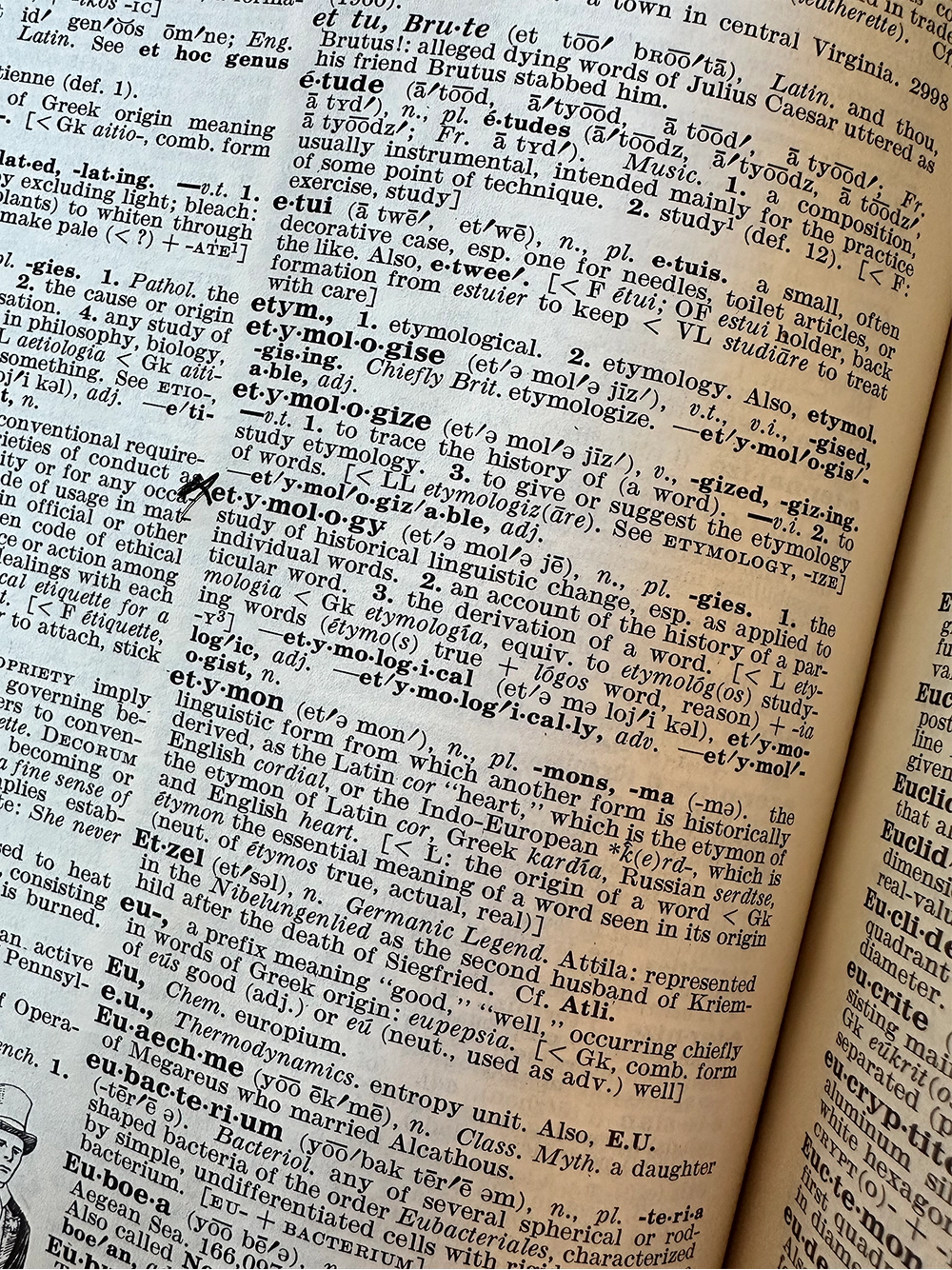News
Marketer Magazine: On The Record: Conducting Strong Interviews with the Media
The True Word: Etymology
At 9 years old, I was written up at Bernard Terrace Elementary School for calling a fifth grader an “asshole.” My father came, spoke with the principal and picked me up. We were quiet in the car on the way home to my house in Capital Heights. I was embarrassed. And still angry at that kid for telling on me as if it were his fault I was in trouble.
As punishment, I was seated at the dining room table with a dictionary in front of me. My dad told me to read the dictionary until I found 10 words I could have called the boy that wouldn’t have gotten me in trouble for vulgarity. I found oaf, sophomoric, dolt, jerk, dullard, imbecile and bizarre and three others that I’ve forgotten. I wrote their definitions down by hand and presented them to my dad, using them in a sentence to be sure the words were mine. They are still mine today. And I love using them in conversations about politics especially.
My dad could have told me to be kinder. To apologize and never call someone a name again. But his choice was to make me better at it, and give me a command of the English language in order to communicate what I thought -- Not to change my thinking. I have relished in strengthening my command of language ever since.
This year, we’re starting a new series for the Obligatory Agency Newsletter. The theme came from a moment staring at the dictionary I keep on a pedestal in my room. Like Ione Skye’s character in “Say Anything,” I mark the words I look up in a dictionary. For 20 years, I had the first big, fat dictionary with full etymologies I’d ever gotten: an Oxford English Dictionary. The real thing. The first dictionary the English language ever had. But it was destroyed in 2008 when a tree crushed my home during Hurricane Gustav. In 2019, I received my grandfather’s 1966 Random House Dictionary and pedestal.

It cost $25 in 1966. That’s $243.44 in today’s dollars. Even so, it’s not my favorite edition for its definitions or details. It’s my grandfather’s. He was a black belt wordsmith with precise language in writing and speaking that inspired me to communicate as perfectly as he did.
When I’m writing, I can easily search for the etymology and denotations of a word, but when I’m stuck on word choice, I stand up, walk around my desk and flip through the pages of the dictionary to read the “real definition” of the word I’m thinking of using.

This tactile time spent is better than the quick answers I can get from Google. It’s the physical movement of walking around and taking the time to slow down. To understand exactly what I mean to say. To understand how to get another person into my mind, so they will understand. What’s the connotation of the word? It’s too much; it’s too little. It’s too subtle to carry the idea. It’s too weighty when I mean something more lithe.
And I stumble across words when I’m looking for one. Looking for pernicious, I discovered that pernickety is the Scottish - origin word with the original spelling of a word (persnickety) that my dad used to accuse me of being.
It’s like the Christian preacher I know who uses the Bible like a tarot card, flipping open the tome to see what scripture God wants her to focus on this week. I flip through the dictionary, reading words and getting excited when I find a new one.
When I’m reading a book and I come across an entirely new word (like “farrago” or “inion,” both discovered today in Herman Melville’s classic, Moby Dick), I walk over to the dictionary to ponder the word. Or a word that I suspect has a different denotation than the connotation I’m picking up (like “monkey jacket” in the same). I want to be sure I understand what the author is trying to say, but also know the word better, I have relationships with words. And the dictionary is like reading their journal to know who they had a crush on in high school. It is intimate and meaningful and lets you get to know a word better than just relying on your historical comprehension.

So, we’re focusing each issue this year on a word. A specific word. A word with meaning. A useful word.
Our first month’s word is “etymology.”
We thought it was appropriate to start with a word regarding words. I loved the poetry of the idea, so here we are.
et·y·mol·o·gy
/ˌedəˈmäləjē/
noun
noun: etymology
the study of the origin of words and the way in which their meanings have changed throughout history.
"the decline of etymology as a linguistic discipline"
the origin of a word and the historical development of its meaning.
plural noun: etymologies
That’s the definition from the Oxford.
In my Random House, it’s this:

Number 3: The derivation of a word is the definition I most often mean when I use the word “etymology.” I’d said, “I like the etymology of that word.” But I suppose I could just as easily remark, “I love etymology!”
According to the editors of most dictionaries, the definitions are put in order of usage. I’ve always put more stock into the origins of words than their current meaning as if where a word came from mattered more than what it means to people now.
Oxford: late Middle English: from Old French ethimologie, via Latin from Greek etumologia, from etumologos ‘student of etymology’, from etumon, neuter singular of etumos ‘true’.
Merriam-Webster: “The etymology of etymology itself is relatively straightforward. Etymon means "origin of a word" in Latin, and comes from the Greek word etymon, meaning "literal meaning of a word according to its origin." Greek etymon in turn comes from etymos, which means "true."
From my studies at St. John’s College, I’ve learned that “logos” is often translated as “word,” like the beginning of the Gospel of John, “In the beginning was the Word, and the Word was with God, and the Word was God.” But “logos” has a whole host of meanings: word, thought, principle, speech, foundation, rational order, utterance, doctrine …
Logos can also refer to a rhetorical appeal to an audience's reason or rationality.
The word logos comes from the Proto-Indo-European root leǵ-, which can mean "I put in order, arrange, gather, choose, count, reckon, discern, say, speak." It is related to the Ancient Greek word légō, which means "I say."
So, if I wanted to build a meaning for etymology from its roots, it could mean “I say the truth,” “my words are true,” “the study of the true meaning of words,” or “to study the history of a word in order to understand its true meaning.”
For me, etymology is what the word meant. Back when people used precise words to express specific meanings – exactly what my team and I try to do every day.
But I’d hate to be too persnickety when it comes to my sophomoric lexicon.
